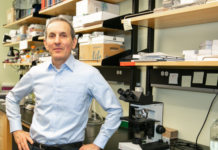Winning a Canada Gairdner Award is a big deal. It’s a prestigious prize awarded for excellence and international impact on human health. And as of 2017, 87 Gairdner laureates have gone on to win the Nobel Prize in Medicine for their research.
That helps explain why interviewing Gairdner winners feels a bit like interviewing lottery winners: they can hardly believe it when they get the call.
“When you get an award, that’s something you’re very surprised about. You say, why me? There are so many good people around,” says 2017 Gairdner winner and vaccine pioneer Rino Rappuoli.
“Then you say, well, if I’ve won I’m not going to say no,” adds Rappuoli with a laugh.
But winning goes beyond individual recognition. It’s validation for an entire field of research and its impact.
“For me, winning the Gairdner Award, it’s a great personal honour,” says 2017 Gairdner winner and pain researcher David Julius. “But I think more than that, it represents all the hard work of people who’ve worked with me and it puts a spotlight on all of us, on whatever field we’ve contributed to.”
“What it does is it gives you some credibility when you stand in front of the microphone to talk to students, or to talk to other scientists, or to talk to clinicians,” adds 2017 Gairdner Wightman winner and stroke researcher Antoine M. Hakim.
That’s a good thing, considering that all Gairdner winners participate in an outreach program, spreading their research to students and the general public, and inspiring them with its global impact.
“It’s very rewarding and very enjoyable to engage the various constituents of the nation of Canada, and of the world in general. To share the work, to share the tech, to share the success, and to share the stories,” says 2016 Gairdner winner and CRISPR-Cas gene editing researcher Rodolphe Barrangou.
“Scientists can come from anywhere,” adds Julius. “The only thing that’s required to do science is your desire to do science.”









































